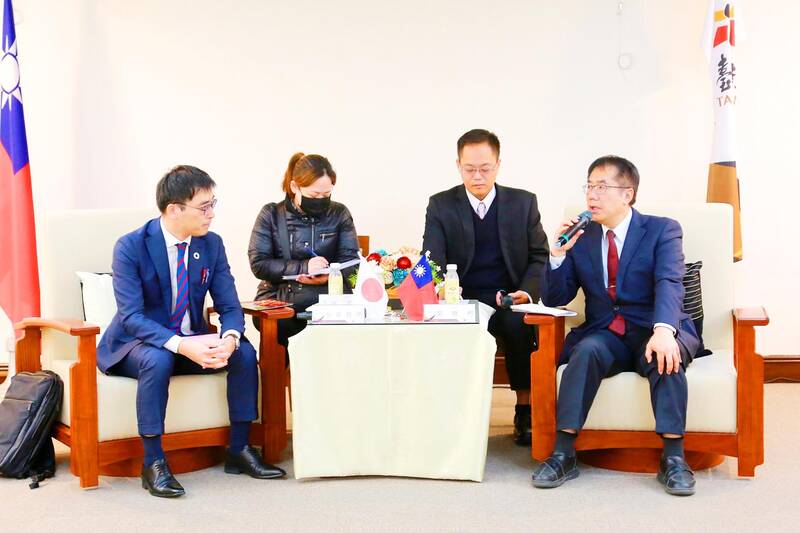Ties between Taiwan and Japan would not be affected by Japanese Ambassador to China Kenji Kanasugi’s pledge to foster a closer Japan-China relationship, the Taiwan-Japan Relations Association said yesterday.
Kanasugi told a news conference in Beijing on Tuesday that his task is to create an environment for “advancing stalled dialogue and consultations,” showing his “eagerness to improve the relationship,” the Asahi Shimbun reported on Wednesday.
Taiwan-Japan Relations Association Deputy Secretary-General Fan Chen-kuo (范振國) said that Kanasugi, who has just taken over the role in China, is an experienced diplomat who is familiar with Taiwan and China, and is known for being firm and prudent.

Photo courtesy of the Tainan City Government via CNA
Kanasugi’s statement was “not surprising,” as it is in line with Japan’s long-term policies toward China — pursuing cooperation rather than provoking confrontation to manage risks, Fan said.
The friendly ties between the governments and people of Taiwan and Japan would not be affected by the new appointment, he said.
As for Taiwan’s bid to join the Comprehensive and Progressive Agreement for Trans-Pacific Partnership, of which Japan is a member, “Japan remains supportive as always,” he said.
Asked whether recent change in the Japanese Cabinet after four senior officials of the faction formerly headed by late Japanese prime minister Shinzo Abe exited amid fraud allegations would affect Taiwan-Japan relations, Fan said that there would not be a significant impact.
Ties between Taiwan and Japan have a solid foundation, and the Ministry of Foreign Affairs has maintained deep and balanced relationships with all Japanese parties and their factions, he said.
In other developments, the association invited young politicians from Japan to meet their counterparts in Taiwan to help build sustainable relationships.
Twenty-five participants, including young assistants to Japanese Diet members, staff of major Japanese parties and local legislators, are in Taiwan for a workshop from Monday to today, Fan said yesterday.
The workshop, which was launched in 2010, resumed after a three-year hiatus to continue cultivating friendly ties between Taiwan and Japan by informing young Japanese politicians about the latest developments in Taiwan, he said.
In addition to visiting the ministry, the Ministry of Economic Affairs and the Mainland Affairs Council, the participants also exchanged opinions with major parties in Taiwan, he said.
The workshop allowed them to learn about Taiwan’s political ecology and campaign events leading up to the presidential and legislative elections on Jan. 13, he said.
Trips to the Taiwan Semiconductor Manufacturing Co Museum of Innovation at Hsinchu Science Park, the Huashan 1914 Creative Park in Taipei and the Hongshulin (紅樹林) ecological area in New Taipei City provided them with opportunities to experience Taiwan’s science and technology development, as well as the nation’s culture and nature, he added.

Chinese Nationalist Party (KMT) Chairman Eric Chu (朱立倫), spokeswoman Yang Chih-yu (楊智伃) and Legislator Hsieh Lung-chieh (謝龍介) would be summoned by police for questioning for leading an illegal assembly on Thursday evening last week, Minister of the Interior Liu Shyh-fang (劉世芳) said today. The three KMT officials led an assembly outside the Taipei City Prosecutors’ Office, a restricted area where public assembly is not allowed, protesting the questioning of several KMT staff and searches of KMT headquarters and offices in a recall petition forgery case. Chu, Yang and Hsieh are all suspected of contravening the Assembly and Parade Act (集會遊行法) by holding

PRAISE: Japanese visitor Takashi Kubota said the Taiwanese temple architecture images showcased in the AI Art Gallery were the most impressive displays he saw Taiwan does not have an official pavilion at the World Expo in Osaka, Japan, because of its diplomatic predicament, but the government-backed Tech World pavilion is drawing interest with its unique recreations of works by Taiwanese artists. The pavilion features an artificial intelligence (AI)-based art gallery showcasing works of famous Taiwanese artists from the Japanese colonial period using innovative technologies. Among its main simulated displays are Eastern gouache paintings by Chen Chin (陳進), Lin Yu-shan (林玉山) and Kuo Hsueh-hu (郭雪湖), who were the three young Taiwanese painters selected for the East Asian Painting exhibition in 1927. Gouache is a water-based

Taiwan would welcome the return of Honduras as a diplomatic ally if its next president decides to make such a move, Minister of Foreign Affairs Lin Chia-lung (林佳龍) said yesterday. “Of course, we would welcome Honduras if they want to restore diplomatic ties with Taiwan after their elections,” Lin said at a meeting of the legislature’s Foreign Affairs and National Defense Committee, when asked to comment on statements made by two of the three Honduran presidential candidates during the presidential campaign in the Central American country. Taiwan is paying close attention to the region as a whole in the wake of a

OFF-TARGET: More than 30,000 participants were expected to take part in the Games next month, but only 6,550 foreign and 19,400 Taiwanese athletes have registered Taipei city councilors yesterday blasted the organizers of next month’s World Masters Games over sudden timetable and venue changes, which they said have caused thousands of participants to back out of the international sporting event, among other organizational issues. They also cited visa delays and political interference by China as reasons many foreign athletes are requesting refunds for the event, to be held from May 17 to 30. Jointly organized by the Taipei and New Taipei City governments, the games have been rocked by numerous controversies since preparations began in 2020. Taipei City Councilor Lin Yen-feng (林延鳳) said yesterday that new measures by